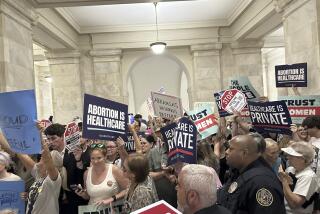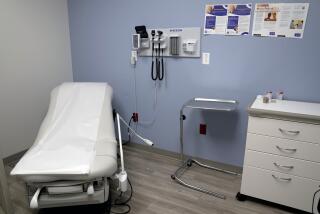Arkansas’ Medicaid work requirement left people uninsured without boosting employment
The Medicaid work requirement plan devised by Arkansas and approved by the Trump administration caused thousands of poor adults to lose their health coverage without generating any evidence that employment increased among the target population, a new study finds.
In fact, the work requirement had only a limited chance for success because nearly 97% of Arkansas residents subject to the mandate — those between the ages of 30 and 49 who were eligible for Medicaid — were already employed or should have been exempt from the new law, according to the study published Wednesday in the New England Journal of Medicine.
Yet the state’s work mandate — the first of its kind in the nation — resulted in 18,000 of the 100,000 targeted people falling off the Medicaid rolls. And although administration officials have said that many of those people may have found jobs, the Harvard researchers who conducted the study said there was no indication that they secured jobs or found other insurance coverage. In fact, the study authors noted a dip in the employment rate among those eligible for Medicaid.
The uninsured rate among 30- to 49-year-old Arkansans eligible for Medicaid increased from 10.5% in 2016 to 14.5% in 2018, while the employment rate fell from about 42% to just below 39%.
While the thousands of Arkansas residents losing Medicaid coverage has been documented since last year, the Harvard study offers the first evidence that the work requirement left them uninsured and did not promote employment.
Asked whether the findings mean the administration should pull the plug on work requirements, study co-author Benjamin Sommers, a health economist at Harvard’s T.H. Chan School of Public Health, said, “It’s time for them to pump the brakes at the very least.”
As millions of nondisabled adults gained Medicaid coverage following the 2010 passage of the Affordable Care Act, conservatives pushed for requiring people to work or do other kinds of “community engagement” to keep their health insurance, much as do food stamps and welfare cash benefit programs. The Trump administration embraced that ideal and has made Medicaid work requirements a central feature of its plan to restructure the federal-state entitlement program, which has more than 70 million enrollees.
Arkansas put the plan into action in the spring of 2018.
But in March, a federal judge struck down Arkansas’ mandate, as well as a plan to begin one in Kentucky. U.S. District Judge James E. Boasberg ruled the work requirement violated federal law because it failed to meet the core objective of Medicaid — getting medical coverage to the poor.
The Trump administration is appealing that ruling. In the meantime, it has approved similar plans in eight other states. Six more states have pending applications to add work mandates.
Seema Verma, administrator of the Centers for Medicare & Medicaid Services, said the work requirements “are not some subversive attempt to just kick people off of Medicaid. Instead, their aim is to put beneficiaries in control with the right incentives to live healthier, independent lives.”
Under the Arkansas law, targeted enrollees were notified via mail and informational flyers that they were required to work 80 hours a month, participate in another qualifying activity such as job training or community service, or meet criteria for an exemption such as pregnancy, a disability or parenting a child.
If they were out of compliance for three months during a calendar year or failed to report their status to the state through online reports, they could lose coverage.
For the first several months of its new mandate, Arkansas required enrollees to use an online portal for that reporting — a problem since 20% lacked internet access and another 20% lacked fast broadband. The state online portal also was unavailable after 9 p.m. each day.
The study, which was based on a telephone survey of about 3,000 low-income adults in Arkansas, found that one-third of those subject to the policy had not heard anything about it, and 44% were unsure whether the requirements applied to them.
“Lack of awareness and confusion about the reporting requirements were common, which may explain why thousands of individuals lost coverage,” the researchers wrote.
The findings contradict claims by federal and state officials that many of those who lost coverage found a job.
Arkansas officials disputed the thrust of the study, noting that the requirement was short-lived because the judge intervened before it was in effect even a year and researchers did not find out why people who were dismissed from Medicaid didn’t reapply.
“You cannot describe this as the robust evaluation that we want and expect,” said Amy Webb, a spokeswoman for the state’s Medicaid program. “The best way to get answers to everyone’s questions about the impact of work and community engagement requirements would be to let Arkansas continue what was started and conduct a true evaluation that follows people over time.”
In a hearing before the Senate Finance Committee this year, Health and Human Services Secretary Alex Azar noted that only 1,452 of the 18,000 people who lost coverage because of the work requirement rules reapplied for Medicaid. “That seems a fairly strong indication that those people got a job and insurance elsewhere and didn’t need the coverage,” he said.
Sommers said the Arkansas experiment answers many questions about how work requirements could function nationally, although he acknowledged that other states might do a better job promoting the program and making it easier for enrollees to report their status.
“There are just not that many people [enrolled in Medicaid] who aren’t working but could,” Sommers said.
He noted Arkansas added the work requirement feature without adding new funding for job training or child support to help people who want to work.
Galewitz writes for Kaiser Health News, an an editorially independent publication of the Kaiser Family Foundation.






